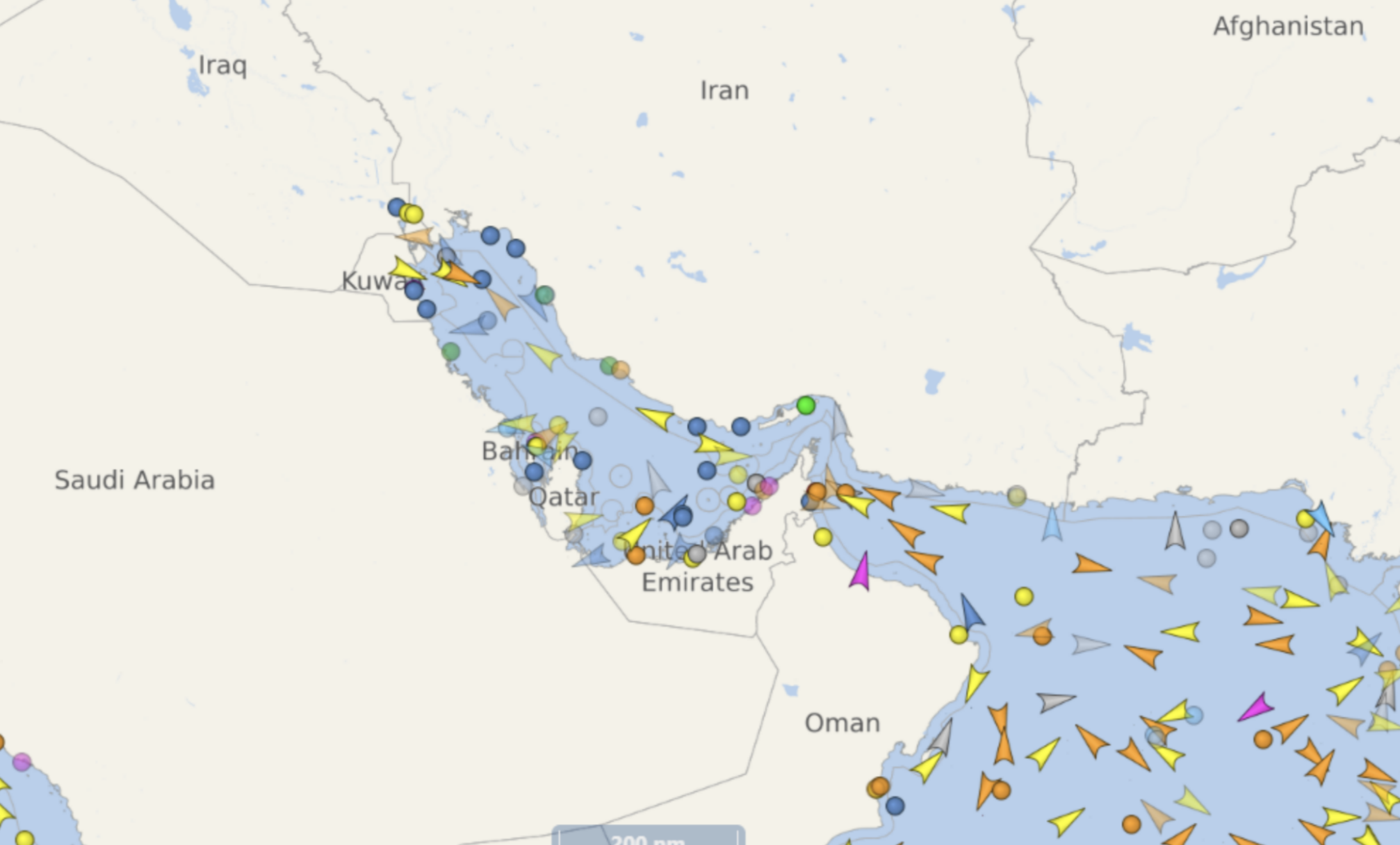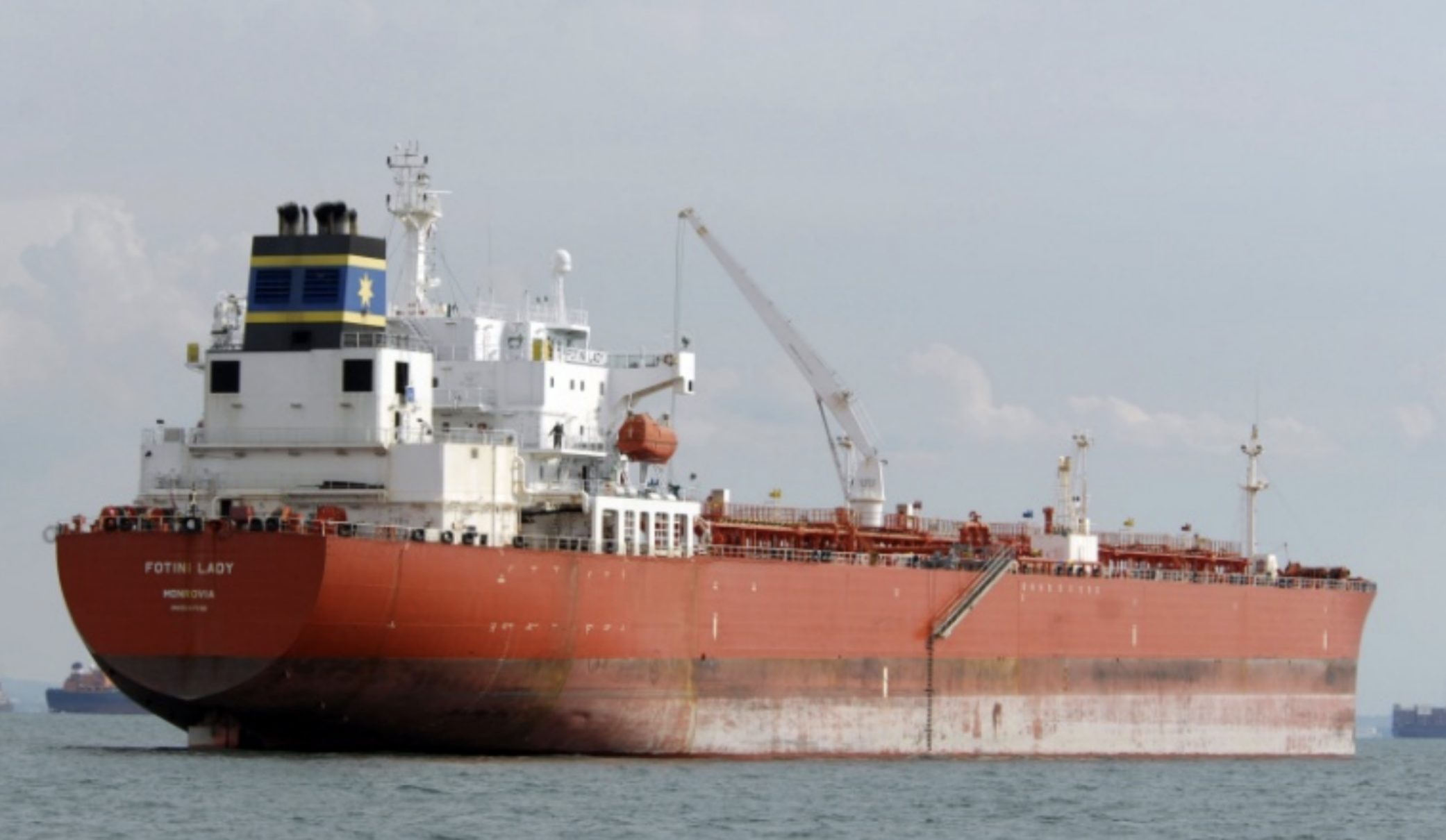US Treasury Department Issues Sanctions for Scheme to Export Iranian Oil Despite Hezbollah, IRGC Restrictions
Oil tankers and other cargo ships near Iran and the UAE on November 7, 2022. Photo: Screenshot from Vessel Finder.
On November 3, the US Department of the Treasury’s Office of Foreign Assets Control (OFAC) announced a series of sanctions against dozens of individuals, companies, and oil tankers for their role in the export of Iranian oil to global markets, violating American sanctions against the Iran Revolutionary Guards Corps (IRGC) Quds Force and Hezbollah on antiterrorism grounds (E.O. 13224).
It follows May 2022 sanctions against another smuggling network tied to the IRGC. According to OFAC, “Viktor Artemov, Edman Nafrieh, Rouzbeh Zahedi, and Mohamed El Zein leveraged dozens of companies under their control to conduct the network’s illicit activities.” Using storage units in the UAE’s Port of Sharjah, the companies blended Iranian and Indian oil and forged certificates of origin and quality for the oil in an effort to evade US and EU sanctions against the sale of Iranian oil.
Iranian businessman Edman Nafrieh oversaw the dozens of companies (actual and those serving as intermediaries to obfuscate the process), allegedly on the orders of "high-ranking Iranian officials" who had him "direct the network's oil smuggling operation profits to companies and bank accounts associated with Hezbollah and IRGC-QF."
Nafrieh and the Tehran-based Gilda Tar Karvan International Company do not appear to have been previously sanctioned by the US. Rouzbeh Zahedi, another Iranian businessman, was similarly sanctioned. Other alleged members of the plot include Mohamed El Zein ("the son of a high-ranking Hezbollah communications director"), who is accused of forging invoices "for consulting and shipping services from shell companies" and Muhammad Ibrahim Bazzi ("a key Hezbollah financier") who has been on OFAC's SDN list since 2018. Nafrieh and his accomplices fronted the oil shipments through Al-Hakeel Al-Aswad Oil Trading LLC.
Of particular importance to the Treasury Department, however, is the involvement of Ukrainian national Viktor Artemov, the manager of Ava Petroleum and the primary seller of the doctored, illicit oil. Per OFAC, Artemov “oversees a vast, complex, and interwoven global network of front companies that are used to facilitate oil shipments on behalf of the oil smuggling network.”
Viktor Sergiyovich Artemov, according to leaked OSI datasets, was probably born in 1975 in Donetsk Oblast, but now appears to hold Swiss residency. Artemov was referenced in the 2015 leak of the Panama Papers, where he was tied to a foreclosed shell company formerly based in the British Virgin Islands (Tilan Commercial LTD) and to an address in Kyiv, Ukraine, according to the International Consortium for Investigative Journalists.
From the late 1990s through to 2014, Artemov served as the director of several presumed shell companies in Cyprus, the UK, and Germany, according to OpenCorporates’s transparency database; they also indicated he was a Ukrainian national.
OFAC reports that, as of 2022, Artemov is or recently was the manager of Ava Petroleum and a 50% owner and director of Petro Naviero. Petro Naviero is the indirect owner of at least nine ships, most registered in Liberia or Djibouti to limit oversight, that carried the oil shipments from Iran to buyers in East Asia.
Shell companies under his management or his associates include Centrum Maritime, Energotrade Plus DMCC, Intrepid Navigators, Rising Tide Shipping, Monumont Ship Management Ltd, Harbour Ship Management Ltd, Expanse Ship Management Ltd, Blue Berri Shipping Inc, and dozens of other subsidiaries. Most are incorporated in Singapore, the Marshall Islands, or Mauritius.
The oil tanker Boceanica, sanctioned due to its ties via various shell companies to Viktor Artemov and for its reported use to transport smuggled Iranian oil, being shown with its original name, Fotini Lady. Photo: Vessel Finder.
The oil tanker Zephyr I, for instance, which OFAC says is owned by Artemov through Centrum Maritime’s subsidiary Monumont, is registered in Panama and reported recent travel to Singapore and China in the fall of 2022. However, a six-week gap in public data recording (during which several thousand nautical miles were logged) could indicate a port call in a sanctioned or sensitive territory, likely in the Middle East.
At least one Artemov subsidiary, Technology Bright, and its oil tanker the "Young Yong", are accused of routinely falsifying the ship's location data (while loading some 1.8 million barrels of oil). Boceanica, registered in Panama and also recently transferred within Artemov's portfolio to Monumont, has spent the last year moving mainly between Japan (an East Asian oil buyer) and the port of Fujairah in the UAE, near where the oil was allegedly doctored and essentially laundered. Julia A, from the same shell company, made frequent trips between China and the UAE over a similar period. Now that the vessels themselves have been sanctioned, most of Artemov’s fleet has moved over the past week towards ports in China and Singapore.
As sanctions are increasingly popularized as an essential, non-military intervention the United States can use, not only as a targeted reaction to individual abuses, but as a major policy tool , it is important to recognize the myriad efforts made to skirt them. Whether in Russia, Iran, Belarus, Syria, Libya, China, and elsewhere, wide-reaching, categorical sanctions can cast a long (though debated) shadow over an economy. The complex web of corruption and falsification exposed by the new sanctions on Artemov and his peers in Iran shows just how many avenues exist to facilitate the evasion of such policies.


